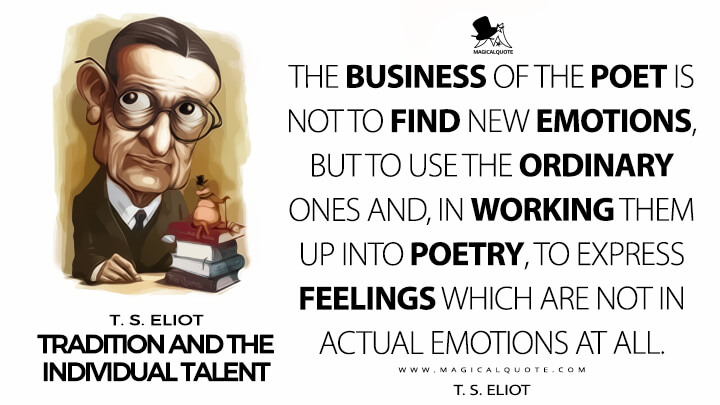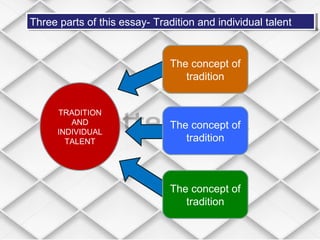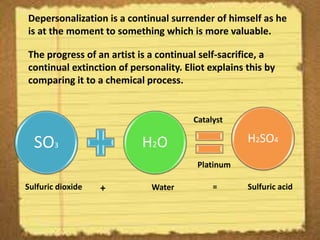This blog is in response to the understanding of https://blog.dilipbarad.com/2014/12/t-s-eliot-tradition-and-individual.html. In this blog I am sharing my understanding about T.S.Eliot Essay on Tradition and Individual Talent.
ESSAY ON POETIC THEORY
Tradition and the Individual Talent
BY T. S. ELIOT:
-Who published it?
The essay was published across two issues of The Egoist, a magazine for which Eliot had become the assistant editor in 1917. The first section was published in volume six number four in September. The second and third were published in volume six number five, in December.
Between 1914 and its closure in 1919, The Egoist became a key site for innovation in the cultural movement which would become known as modernism. Besides Eliot’s work, and poetry and criticism by his friend Ezra Pound, The Egoist printed James Joyce's first novel, A Portrait of the Artist as a Young Man (1916), and parts of Joyce’s Ulysses (1922). These last two books were ‘serialized’, in other words chapters were printed in separate editions of the magazine. But The Egoist also printed Eliot’s Prufrock and other Observations (1917) as a stand-alone book.
The essay Tradition and the Individual Talent is an attack on certain critical views in Romanticism particularly up on the idea that a poem is primarily an expression of the personality of the poet. Eliot argues that a great poem always asserts and that the poet must develop a sense of the pastness of the past. There is great importance of tradition in the present poem. Tradition should not be inherited but should be obtained by great labor. Past should be altered by present as much as the present is directed by past.
The meaning of the poem is not possible in isolation. Not poet, no any artist has his complete meaning unless we link him/ her to a chain of all poets. Impotence and value of any poet can’t be judged in isolation. So there must be the tradition to compare are with another.
Eliot’s Notion of Tradition
Eliot begins the essay by pointing out that the word tradition is not acceptable to
the English because it may not carry the idea of being original. The English praise poets
for works that are individual and original. The true mark of a poet lies in his originality.
This importance on individuality shows that the English praise poets for the wrong
reasons. Eliot does not agree with the English because he feels that the best and the
most individual part of a poet’s work would reflect the influence of the writers of the past.
In Eliot’s own words: “If we approach a poet without his prejudice, we shall often find
that not only the best, but the most individual parts of his work may be those in which the
dead poets, his ancestors assert their immortality most vigorously”.
There are some questions and I am going to answers according to my own understanding or it is based on my interpretations.
1).How would you like to explain Eliot's concept of Tradition? Do you agree with it?
- Yes, I agree.
T.S. Eliot belongs to the tradition of Dryden, John, Coleridge, and Matthew Arnold in being the poet and the critic at the same time. He was greatly interested in literature and tried to bring criticism and creation in closer contact. He strongly believed that criticism and creation were complementary activities and therefore a good poet could only be a good critic. He exercised a very wide and deep influence on the literary criticism in the present century. He has rendered a great service to literature by reforming taste and by revitalizing literature. The most distinguishing quality of Eliot's criticism is its sincerity and freedom from any preconceived standards of judgment. He places before the artist as well as the critic the goal of attaining nothing less than excellence and insists that the critic in order to see the object as it is must take unremitting pains and discipline his powers.
He also points out that mature art is created only in a society which is prepared to receive and grasp fresh ideas. He knows that though perfection is rather unattainable, he would, in poetry and criticism, be content with nothing less than that. In literature he was a classicist and supported order and discipline, authority and tradition, and organization and pattern.
The theme of tradition is central both to Eliot's criticism and to his creative work. His instance on the value and importance of tradition for the individual talent is essentially anti-romantic. The romantic theory, which regarded poetry as the expression of the personality of the poet, laid emphasis on inspection and intuition. The romantics believed that the poet should follow his "inner voice" in writing poetry. But inspiration is fitful and unreliable; it is only a matter of chance and accident. In the hands of lesser poets the unrestrained and unlimited freedom is likely to degenerate into chaos and confusion. The romantic theory did not attach any significance to tradition. On the contrary, freedom from all tradition was considered to be very essential for artistic creation.
2). What do you understand by Historical Sense? (Use these quotes to explain your understanding)
-"The historical sense involves a perception, not only of the pastness of the past, but of its presence"
-This historical sense, which is a sense of the timeless as well as of the temporal and of the timeless and of the temporal together, is what makes a writer traditional.
T.S. Eliot is the most influential poet and critic in the Modern Age. He expresses his notion of 'historical sense' in his revolutionary essay," Tradition and Individual Talent". He thinks that tradition depends on the complete realization of historical sense. Tradition involves a historical sense which enables a poet to perceive the importance of past and present. The historical sense enables him to realism that the past is not something isolated from the present. It is a perception of the pastness of the past and its presentences too. It implies the presence of a collective mind. A man of historical sense feels that the whole literature of Europe from Homer down to his own day including the literature of his own country forms one continuous literary tradition. According to T.S. Eliot, tradition does not mean a blind adherence to the ways of previous generation or generations.
The historical sense involves a perception not only of the pastness of the past but also of its presence. Eliot realizes that the past exists in the present. So the past and the present form.one simultaneous order. This historical sense is the sense of the timeless and of the temporal together. It is this historical sense which makes a writer traditional. A writer with the sense of tradition is fully conscious of his own generation. He is completely aware of his place in the present. But he is also acutely conscious of his relationship with the writers of the past. In brief, sense of tradition implies recognition of the continuity of literature. It implies a critical judgement as to which of the writers of the past continue to signify in the present.
3).What is the relationship between “tradition” and “the individual talent,” according to the poet T. S. Eliot?
-The concept of “tradition” according to Eliot is the sense of continuity from the past. It is a continuity where a writer or a poet should write in tradition and it is readily unacceptable to the Whites as it is like a “censure”. The Western world seems to be occupied more on the creative forces but Eliot stresses on the elements of critical thoughts while obtaining a “tradition’. According to Eliot, a poet has to write in “tradition” and there exist the elements of past in the work of poet’s art when it is examined or explored from a critical lens rather than a creative force. The very “individual parts” will show the impressions of the continuity of the past or the elements of past which the poet has taken from which has been already existed before. He states that “the most individual parts of his work may be those in which the dead poets, his ancestors ,assert their immortality vigorously”.
According to Eliot , if a poet or a writer imbues the element of the past, there is an imitation of the past but he justifies that the imitation is “not the slavish imitation” of the past or the existed work of art before. He argues that the strict blinding of imitation of the past is not tradition and hence “Novelty is better than repetition”. He tries to suggest that a poet do not slavishly imitate the past but there is something new which is born out of that imitation. Hence, there will be a new novelty in the piece of work of art which he implies the “individual talent”. He says that a passive imitation of the past is to be discouraged and ignored.
Lastly, Eliot also points out the judgement of the new piece of work in the present. He states that the judgement of the new piece of work is done by comparison and contrast between the past and the present that has altered the past. It is not merely done through a comparison and contrast but it is to see the manners in which the present has modified or altered the past and the present has done to the past. It is to observe the range of changes in the new work of art in the present and to the past as well as to undermine the values of the past and present to be equally balanced without undermining the past as well as the present. Hence, Eliot says that this is the real sense of “tradition’.
4).Explain:
"Some can absorb knowledge, the more tardy must sweat for it. Shakespeare acquired more essential history from Plutarch than most men could from the whole British Museum".
-It means that only those who do not have sense of understanding must literary read, other can learn by absorbing from experience and observation and a little reading. Eliot demand from his poet as well as from his reader a wide reading. For better understanding he gives example of luminaries like Shakespeare who was not highly educated in the conventional sense but what it is still that Shakespeare array of entire age because he seems to lived his age and absorbed knowledge. We can say here Eliot actually borrowing idea from Matthew Arnold, his essay on function of criticism but in the essay of Function of criticism at the present time mentioned that great epochs of creativity doesn't come often
5).Explain:
"Honest criticism and sensitive appreciation is directed not upon the poet but upon the poetry"
New Critics took a hint from Eliot in regard to his "'classical' ideals and his religious thought; his attention to the poetry and drama of the early seventeenth century; his deprecation of the Romantics, especially Shelley; his proposition that good poems constitute 'not a turning loose of emotion but an escape from emotion'; and his insistence that 'poets... at present must be difficult'." He had argued that a poet must write "programmatic criticism", that is, a poet should write to advance his own interests rather than to advance "historical scholarship". Unwittingly, Eliot inspired and informed the movement of New Criticism. This is somewhat ironic, since he later criticized their intensely detailed analysis of texts as unnecessarily tedious. Yet, he does share with them the same focus on the aesthetic and stylistic qualities of poetry, rather than on its ideological content. The New Critics resemble Eliot in their close analysis of particular passages and Poem.
6).How would you like to explain Eliot's theory of depersonalization? You can explain with the help of chemical reaction in presence of catalyst agent, Platinum.
7). Explain:
" Poetry is not a turning loose of emotion, but an escape from emotion; it is not the expression of personality, but an escape from personality."
This is more or less a direct riposte to William Wordsworth’s statement (in the ‘Preface’ to Lyrical Ballads in 1800) that ‘poetry is the spontaneous overflow of powerful feelings’. But Eliot the modernist had no time for the idea that poetry was a turning loose or release of emotion. He was what T. E. Hulme had earlier categorised as a ‘classicist’, holding to a classical rather than romantic view of poetry. This is in keeping with his earlier argument about the importance of tradition: the poet’s personality does not matter, only how their work responds to, and fits into, the poetic tradition. In Eliot’s work – and we can see this as soon as we realise just how much of his most famous poem, The Waste Land, is about a shoring up or preserving of literary tradition, even civilisation itself, on the brink of ruin – the tradition is everything and the individual poet is merely one part of a much larger whole.
But Eliot’s argument is a little more complicated than it first appears. It’s often assumed that Eliot is saying that, because poetic personality doesn’t matter, the poet’s self doesn’t matter either: poetry is impersonal in that it could come from anyone, if only they read the right books and set to work. But as the critic C. K. Stead argued in his brilliant The New Poetic: Yeats to Eliot (Continuum Impacts) , Eliot’s talk of escape from personality is not actually a call to escape from the self but a call to escape further into the self.
, Eliot’s talk of escape from personality is not actually a call to escape from the self but a call to escape further into the self.
 , Eliot’s talk of escape from personality is not actually a call to escape from the self but a call to escape further into the self.
, Eliot’s talk of escape from personality is not actually a call to escape from the self but a call to escape further into the self.Poetry may not be a ‘turning loose of emotion’, but it is only the poet’s own raw emotion that they are escaping. And the poet seeks to escape their own undiluted emotions in order that they may better recreate authentic emotions in their work.
8).Write two points on which one can write critique on 'T.S. Eliot as a critic'.
T.S Eliot is one of the greatest literary critics of England from the point of view of the bulk and quality of his critical writings. His five hundred and odd essays occasionally published as reviews and articles had a far-reaching influence on literary criticism in the country. His criticism was revolutionary which inverted the critical tradition of the whole English speaking work. John Hayward says:
"I cannot think of a critic who has been more widely read and discussed in his own life-time; and not only in English, but in almost every language, except Russian."
Such critics are rare, for they must possess, besides ability for judgment, powerful liberty of mind to identify and interpret its own values and category of admiration for their generation. John Hayward says:
Matthew Arnold was such a critic as were Coleridge and Johnson and Dryden before him; and such, in our own day, is Eliot himself.
Eliot’s criticism offers both reassessment and reaction to earlier writers. He called himself “a classicist in literature”. His vital contribution is the reaction against romanticism and humanism which brought a classical revival in art and criticism. He rejected the romantic view of the individual’s perfectibility, stressed the doctrine of the original sin and exposed the futility of the romantic faith in the “Inner Voice”. Instead of following his ‘inner voice’, a critic must follow objective standards and must conform to tradition. A sense of tradition, respect for order and authority is central to Eliot’s classicism. He sought to correct the excesses of “the abstract and intellectual” school of criticism represented by Arnold. He sought to raise criticism to the level of science. In his objectivity and logical attitude, Eliot most closely resembles Aristotle. A. G. George says:
Eliot’s theory of the impersonality of poetry is the greatest theory on the nature of the process after Wordsworth’s romantic conception of poetry.
To conclude, Eliot’s influence as a critic has been wide, constant, fruitful and inspiring. He has corrected and educated the taste of his readers and brought about a rethinking regarding the function of poetry and the nature of the poet process. He gave a new direction and new tools of criticism. It is in the re-consideration and revival of English poetry of the past. George Watson writes:
Eliot made English criticism look different, but not in a simple sense. He offered it a new range of rhetorical possibilities, confirmed it in its increasing contempt for historical processes, and yet reshaped its notion of period by a handful of brilliant institutions.
Here are some videos you can refer for more understanding.
I Know this Blog is lengthy but Here I have written about my understanding. all the above answers are my interpretations. Thank you so much reading this blog.
{Words-2796}
{Images-02}
{Video-03}



No comments:
Post a Comment